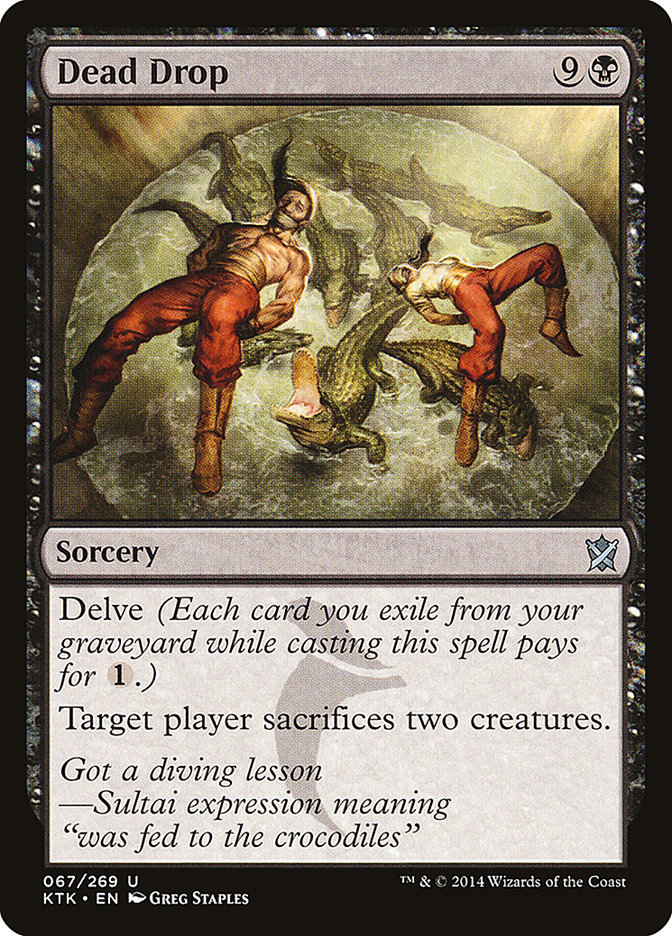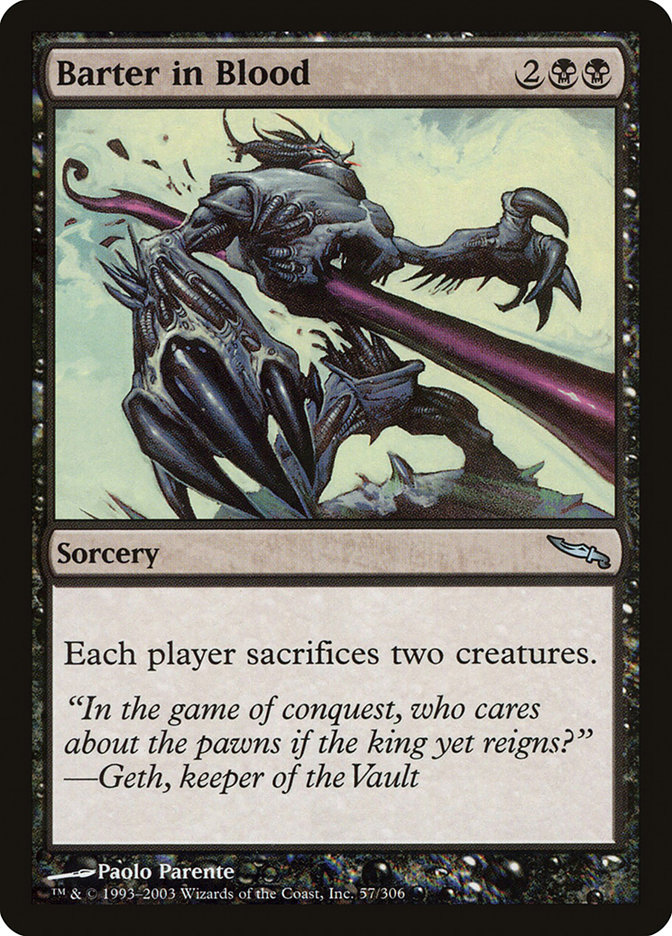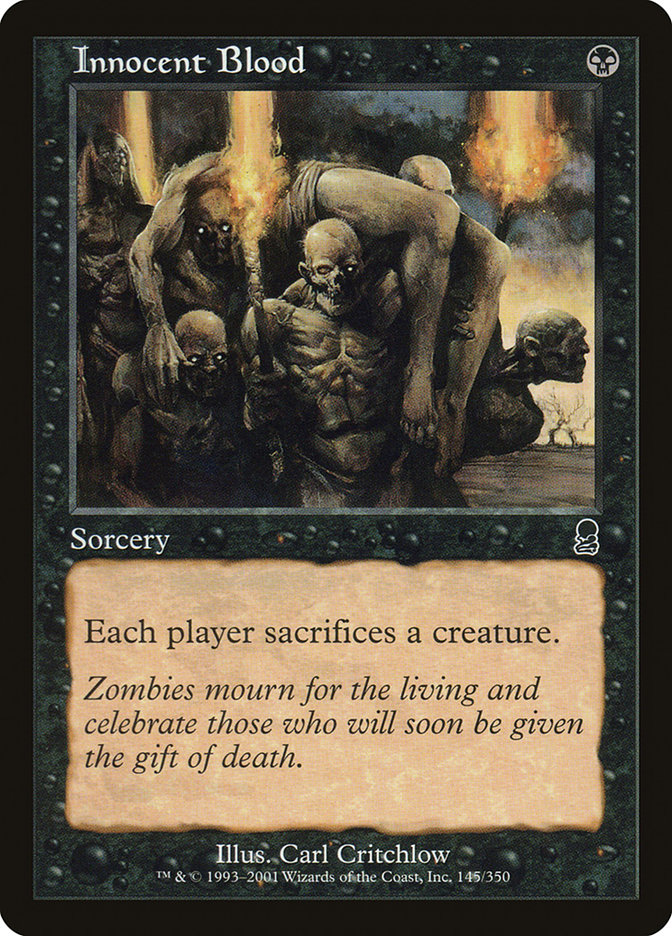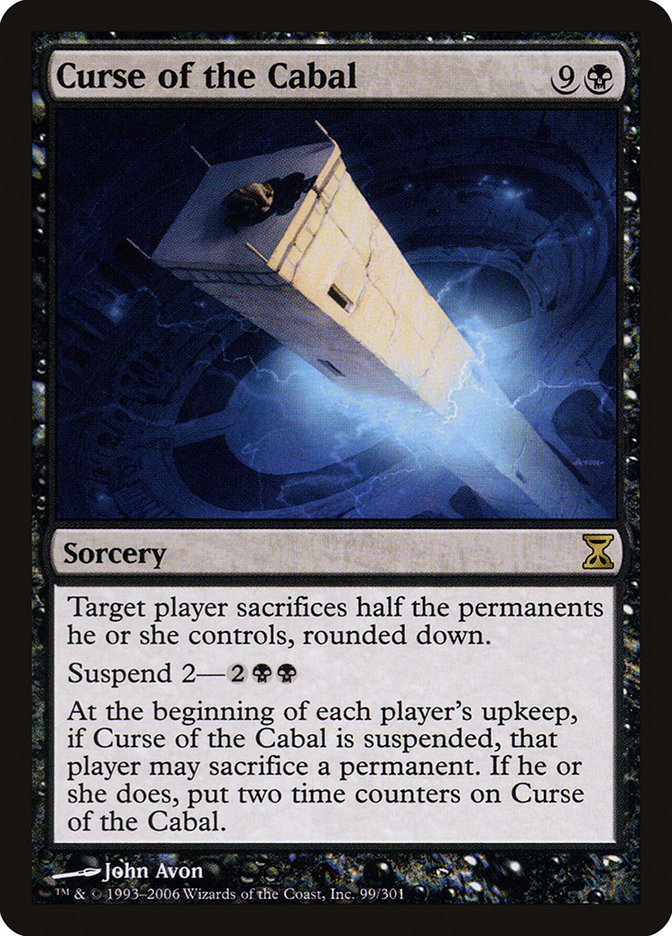Dead Drop MTG Card
| Mana cost | |
| Converted mana cost | 10 |
| Rarity | Uncommon |
| Type | Sorcery |
| Abilities | Delve |
| Released | 2014-09-26 |
| Set symbol | |
| Set name | Khans of Tarkir |
| Set code | KTK |
| Number | 67 |
| Frame | 2015 |
| Layout | Normal |
| Border | Black |
| Illustred by | Greg Staples |
Text of card
Delve (Each card you exile from your graveyard while casting this spell pays for .) Target player sacrifices two creatures.
Got a diving lesson —Sultai expression meaning "was fed to the crocodiles"
Cards like Dead Drop
Dead Drop is an intriguing spell in the realm of removal cards in MTG, often set alongside other impactful cards such as Murderous Cut. Both capitalize on the delve mechanic, allowing you to exile cards from your graveyard to help pay for the mana cost. Unlike Murderous Cut, which can be swift and budget-friendly with its single target removal, Dead Drop ups the ante by demanding the opponent sacrifice two creatures. It’s a significant increase in potential board impact.
Another parallel can be drawn with Barter in Blood, a card that also forces each player to sacrifice two creatures. The main difference here is the lack of the delve ability, making Dead Drop potentially more mana-efficient. However, Barter in Blood’s lack of targeting can sometimes bypass indestructible or hexproof creatures, giving it a unique edge. Then there’s Innocent Blood, offering a similar effect on a much smaller scale – each player sacrifices one creature – being a more consistent but less powerful option.
In summary, Dead Drop stands out in MTG as a removal card with the potential to influence the game’s tide with its dual-sacrifice feature, provided the delve condition can be met. It’s an excellent choice for players who can strategically manipulate their graveyard to their advantage.
Cards similar to Dead Drop by color, type and mana cost
Card Pros
Card Advantage: Dead Drop can be pivotal for shifting the tide of the game by forcing an opponent to sacrifice multiple creatures, effectively skewing the numbers in your favor and potentially clearing the way for a decisive victory.
Resource Acceleration: While not directly providing mana or acceleration, the delve mechanic allows you to utilize cards from your graveyard to cast it for a substantially reduced mana cost, thereby leveraging your resources more efficiently.
Instant Speed: The ability to cast Dead Drop at instant speed offers strategic flexibility, letting you wait for the perfect moment during your opponent’s turn to disrupt their plans and remove key creatures after they have committed to actions or attacks.
Card Cons
Discard Requirement: One limiting aspect of Dead Drop is the necessity to discard other cards from your hand, significantly affecting your game if your resources are already sparse.
Specific Mana Cost: Dead Drop demands a specific mana investment of one black and nine generic mana, which may not always align with the flexibility required by some strategies or mana bases.
Comparatively High Mana Cost: With a steep cost of ten mana in total, Dead Drop is a heavy investment, especially when you’re in dire need of an immediate response. Many players find alternative removal options that are much more mana-efficient.
Reasons to Include Dead Drop in Your Collection
Versatility: Dead Drop may look specific at first glance, but its ability to force an opponent to sacrifice two creatures can be a game-changer in a variety of situations. This card is adaptable, fitting well in control or sacrifice-themed decks that seek to clear the board and gain an advantage over creature-heavy strategies.
Combo Potential: This card shines in decks that manipulate the graveyard. With its delve mechanic, it allows you to exile unwanted cards from your graveyard to reduce its mana cost, potentially casting a significant spell for a mere fraction of the cost. In combination with cards that fill your graveyard, Dead Drop becomes a powerful tool.
Meta-Relevance: Depending on the meta, where creature-based strategies dominate the battlefield, Dead Drop can provide a crucial swing in momentum. It’s a strong sideboard option or even a main deck card when the environment is ripe with creature-focused decks, ensuring you stay ahead in the war of attrition.
How to beat
Dead Drop is an intriguing card in the world of Magic: The Gathering, with the ability to profoundly shift the balance of the board by forcing a player to sacrifice two creatures. This removal can be devastating, but there are strategies to mitigate its impact. A key to overcoming this card is maintaining a steady stream of low-cost creatures. By populating the board with expendable tokens, the effect of Dead Drop is significantly reduced, as the loss of less critical creatures dampens its blow.
Another effective tactic is to make use of instant-speed removal or counterspells. By holding up mana and waiting for an opportune moment, players can respond to Dead Drop by removing their own creatures in exchange for an effect, or counter the spell outright, preventing its execution. Cards such as Negate or Heroic Intervention can provide protection against this threatening sorcery. Additionally, graveyard hate cards can prevent Dead Drop from being a viable option by exiling cards from opponents’ graveyards, thus increasing its casting cost beyond a manageable amount.
Ultimately, by building your strategy with these considerations in mind, Dead Drop’s potential impact can be effectively contained, allowing you to maintain control of the battlefield and press your advantage in Magic: The Gathering.
Where to buy
If you're looking to purchase Dead Drop MTG card by a specific set like Khans of Tarkir, there are several reliable options to consider. One of the primary sources is your local game store, where you can often find booster packs, individual cards, and preconstructed decks from current and some past sets. They often offer the added benefit of a community where you can trade with other players.
For a broader inventory, particularly of older sets, online marketplaces like TCGPlayer, Card Kingdom and Card Market offer extensive selections and allow you to search for cards from specific sets. Larger e-commerce platforms like eBay and Amazon also have listings from various sellers, which can be a good place to look for sealed product and rare finds.
Additionally, Magic’s official site often has a store locator and retailer lists for finding Wizards of the Coast licensed products. Remember to check for authenticity and the condition of the cards when purchasing, especially from individual sellers on larger marketplaces.
Below is a list of some store websites where you can buy the Dead Drop and other MTG cards:
 BUY NOW
BUY NOW BurnMana is an official partner of TCGPlayer
- eBay
- Card Kingdom
- Card Market
- Star City Games
- CoolStuffInc
- MTG Mint Card
- Hareruya
- Troll and Toad
- ABU Games
- Card Hoarder Magic Online
- MTGO Traders Magic Online
See MTG Products
Legalities
Magic the Gathering formats where Dead Drop has restrictions
| Format | Legality |
|---|---|
| Historicbrawl | Legal |
| Historic | Legal |
| Legacy | Legal |
| Oathbreaker | Legal |
| Gladiator | Legal |
| Pioneer | Legal |
| Commander | Legal |
| Modern | Legal |
| Vintage | Legal |
| Duel | Legal |
| Explorer | Legal |
| Penny | Legal |
| Timeless | Legal |
Rules and information
The reference guide for Magic: The Gathering Dead Drop card rulings provides official rulings, any errata issued, as well as a record of all the functional modifications that have occurred.
| Date | Text |
|---|---|
| 2014-09-20 | Because delve isn’t an alternative cost, it can be used in conjunction with alternative costs. |
| 2014-09-20 | Dead Drop doesn’t target any creature. The target player could sacrifice a creature with hexproof, for example. |
| 2014-09-20 | Delve doesn’t change a spell’s mana cost or converted mana cost. For example, Dead Drop’s converted mana cost is 10 even if you exiled three cards to cast it. |
| 2014-09-20 | The rules for delve have changed slightly since it was last in an expansion. Previously, delve reduced the cost to cast a spell. Under the current rules, you exile cards from your graveyard at the same time you pay the spell’s cost. Exiling a card this way is simply another way to pay that cost. |
| 2014-09-20 | The target player chooses which creatures they will sacrifice as Dead Drop resolves. If the player controls only one creature at that time, they will sacrifice it. |
| 2014-09-20 | You can’t exile cards to pay for the colored mana requirements of a spell with delve. |
| 2014-09-20 | You can’t exile more cards than the generic mana requirement of a spell with delve. For example, you can’t exile more than nine cards from your graveyard to cast Dead Drop. |




